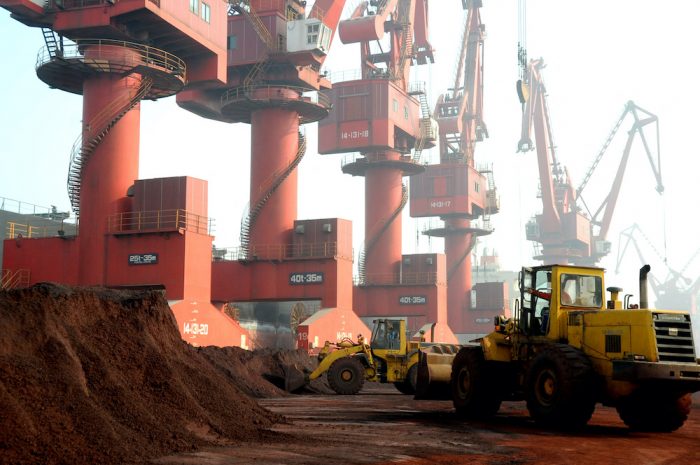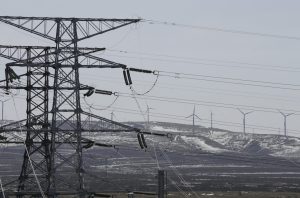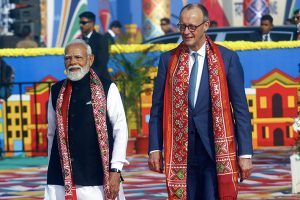Beijing has said it is willing to issue faster approvals for exports of rare earths to the European Union following trade dialogue with the bloc, including on the EU’s anti-subsidy case against Chinese electric vehicles.
A spokesperson for China’s Ministry of Commerce said on Saturday that Beijing “attaches great importance to the EU’s concerns and is willing to establish a green channel for qualified applications to speed up approval” for rare earths.
China was also committed to maintaining “timely communication” on the issue with the EU, the spokesperson said in a statement on Saturday.
Also on AF: China Export Curbs on Rare Earth Magnets: a Trade War Weapon
The statement followed dialogue between China’s Minister of Commerce Wang Wentao and the EU’s Commissioner for Trade and Economic Security Maros Sefcovic in France last week.
Details of their talks were only revealed on Saturday in the Chinese commerce ministry’s statement posted on its website. Sefcovic had previously described the talks in Paris with Wang as “focused and in depth”.
The Chinese commerce ministry spokesperson, meanwhile, said that the two trade envoys had “frank and in-depth discussions on urgent and important issues such as the EU’s anti-subsidy case against China’s electric vehicles, China’s anti-dumping case against EU brandy, and export controls.”
The spokesperson said China was pushing for “a proper solution” in the EV case, which involved the EU imposing tariffs as high as 35% on electric vehicles imported from China.
The EU’s tariffs went into effect in October last year. Amid ongoing dialogue with China, however, the bloc decided in April to set minimum prices for imported Chinese-made EVs, instead of subjecting them to tariffs.
In its statement on Saturday, the Chinese foreign ministry said the price commitment consultations were now in “the final stage” but that both sides still needed to make more effort.
“The EU proposed that new technical paths could be explored at the same time,” it said, adding that China would evaluate the feasibility of the EU’s proposal.
The infusion of talks on the EU’s EV tariffs with those around China’s rare earth blockade signal Beijing’s willingness to leverage its dominance in the critical industry in trade talks with the West.
The commerce ministry’s statement made only a short mention of the rare earth issue — right at the end — and followed that up with a call for EU to “meet China halfway” to “facilitate, safeguard and promote compliant trade in high-tech products to China.”
On Monday, Chinese state-sponsored newspaper, the China Daily, reported that Beijing had approved a number of export licence applications for rare earth-related items. The report did not share any details, but referred to a statement issued by the Ministry of Commerce.
Automakers in ‘full panic’
Beijing’s statement could bring some calm to European automakers, many of whom are in a state of “full panic”, according to industry insiders, due to China’s rare earth blockade.
One German magnet maker, Magnosphere, told Reuters that many automakers and parts suppliers are “willing to pay any price” for magnet supplies.
Cars today use rare-earths-based magnets in dozens of components, including motors, side mirrors, stereo speakers, oil pumps, windshield wipers, and sensors for fuel leakage and braking.
As a result, many in the industry are comparing the current rare earth crisis to the semiconductor shortage between 2021 to 2023 that wiped away millions of cars from automakers’ production plans.
Several European auto-supplier plants have already shut down, with more outages coming, the region’s auto supplier association, CLEPA, said.
“Sooner or later, this will confront everyone,” CLEPA secretary-general Benjamin Krieger said.
The European Automobile Manufacturers’ Association, which represents the likes of Stellantis, Renault, Ferrari, Volkswagen and Volvo, also told CNBC that some of its members could potentially face production outages starting as soon as next month.
Some industry insiders are now also citing worry over China’s grip over other raw materials required by the auto industry.
A 2024 European Commission report said China controls more than 50% of global supply of 19 key raw materials, including manganese, graphite and aluminum.
Andy Leyland, co-founder of supply chain specialist SC Insights, said China can use any of those elements as leverage in future. “This just is a warning shot,” he said.
Will they, won’t they?
Across the industry, automakers have been trying to wean off of China for rare-earth magnets, or even develop magnets that do not need those elements. But most efforts are years away from the required scale.
At such a time, promises from Beijing have had little effect on the industry’s morale.
One European executive in Beijing told the Financial Times that cars and parts-makers could still face delays in receiving their rare earth and magnet shipments due to a “huge backlog” of licence applications.
Reuters previously reported that approvals for those licences were being overseen by just three senior officials within a branch of China’s commerce ministry.
The European Union Chamber of Commerce in China also warned on Friday that progress on rare earth approvals had “not been sufficient” with firms facing delays and a lack of transparency in the licensing process.
Similarly, Maximilian Butek, an executive director and board member of the German Chamber of Commerce in China, told CNBC on Monday that China had created a “huge bureaucratic monster” with its licensing regime. Butek said he was still unsure whether Beijing could now really speed up the process.
He also added that mere announcements from Beijing were not enough to calm the industry as it faces a severe supply chain crisis. “They have to show it,” he said.
Approvals in for some in Japan, US
Meanwhile, the Japanese Chamber of Commerce and Industry in China said on Monday that Beijing had started approving some rare earth exports, without sharing much information.
The Japanese Chamber of Commerce and Industry in China said it asked the Chinese commerce ministry on May 28 to speed up the review process. In response, the ministry expressed “understanding of the situation of Japanese companies,” the group said, according to a Reuters report.
The ministry also committed to facilitate smooth business operations, with export approvals now beginning to be issued, it said.
Separately, Reuters also reported on Friday that China had granted temporary export licenses to rare-earth suppliers of the US’ top three automakers.
Suppliers of General Motors (GM), Ford and Jeep-maker Stellantis got clearance for some rare earth export licenses last week, Reuters reported citing sources familiar with the matter.
At least some of the licenses were valid for six months, it added.
Meanwhile, on Monday, White House economic adviser Kevin Hassett said the US’ top three negotiators were seeking a handshake with China on rare earths as part of their talks in London later.
“The purpose of the meeting today is to make sure that they’re serious, but to literally get handshakes… and get this thing behind us,” Hassett, director of the National Economic Council, told CNBC in an interview.
“I expect it to be a short meeting with a big, strong handshake,” Hassett said.
“Our expectation is that… immediately after the handshake, any export controls from the US will be eased, and the rare earths will be released in volume, and then we can go back to negotiating smaller matters,” he added.
- Vishakha Saxena, with Reuters
Also read:
China’s Rare Earths 1, Donald Trump 0
Lessons From Japan on Tackling China’s Rare Earth Dominance
US and Chinese Officials Begin High Stakes Trade Talks in London
China’s Exports to US Plunge, as Deflation Hits Two-Year High
China Sets up Tracking System to Trace Its Rare Earth Magnets
Carmakers Stressed by China’s Curbs on Critical Mineral Exports
US Wants Vietnam To Cut Trade With China As Part Of Tariff Deal
China Follows US Playbook in Rare Earth Crackdown; Tesla Hit
China Plunders Rare Earth Minerals as Myanmar’s Civil War Rages
EU Rejects US Offer to Cut Tariffs if it Pulls Away From China























